My name is Rukshana Kapali. I am a transgender woman.
When I was born everyone was happy to have a ‘boy’ child. Our society is very patriarchal. I was the first child of my parents’ and also the first grandchild. As far as I can remember, I was always told by others that I was ‘feminine’. But I didn’t know what ‘masculine’ and ‘feminine’ was as a child.
I am not studying now. Two years ago, I went to Tribhuvan University affiliated college to get admission in a Bachelor’s program. Tribhuvan University didn’t admit me because they didn’t recognize my gender identity. My school certificates have me listed as ‘Male’ and address me with my deadname. My citizenship addressed me by the name I want, but lists me as ‘Others’. With lack of any proper legislation, I have nothing I can do. I quit and did nothing for two years after that. Now, I am active in Queer Youth Group where we work on queer people & human rights issues. We do three major works: legal advocacy, awareness campaigns & resource generation. We advocate for making sure our voices are represented in our policies. We also do awareness programs about queer issues in schools. We include it in our broader curriculum of comprehensive sexuality education. In this, we give knowledge about sexuality beyond ‘opposite attracts’ and teach them that gender is not ‘two rigid boxes’. Many organizations and government offices also invite us to give workshops and raise awareness on the topic.
Sometimes it feels like you have moved on but then you are forced to go back.
When I was a kid, I didn’t know what gender was. I think no one knew what gender was. It was just like society says, one wears a skirt and one wears pants. I remember coming back from school and acting like my teacher, Ms. Lalita. I can’t remember her face anymore but back then I would wear a skirt and try to act like her. I used to wear my aunt’s high heels. There were a lot of different things which people took as me being ‘girly’. My hair was also long. In our tradition, we don’t cut hair for many years. My mother braided my hair to go to school. A lot of people would ask my mother, ‘is this your daughter?’ I remember being happy when people said that. But my mother always explained to them that I was her son; which I didn’t really like.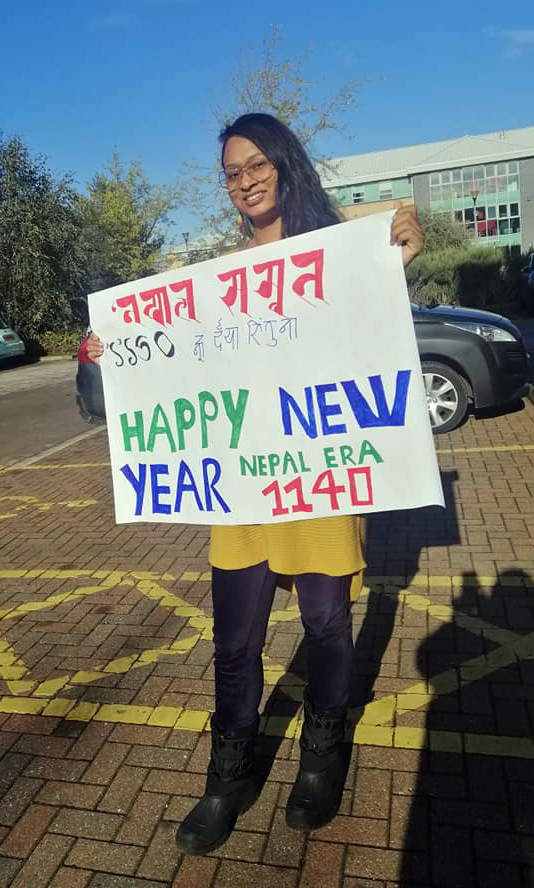
I would wear my grannie’s sari whenever I came back from school. At home I loved dressing as a girl, which people found very offensive. I remember one day, in second grade, one of my relatives slapped me very badly for dressing the way I liked.
My school didn’t allow us to have long hair so I had to eventually cut it and that made me very unhappy. To sum this concisely, the way I saw myself was not the way society saw me. I couldn’t figure out what was happening with me because I was too young then. I think when I was in fifth grade when my friends started to say, “You walk in a feminine way”. I asked them what a feminine way meant and they said that I moved my hips like a woman.
When I reached sixth grade maybe due to our socialization everything started to be separate. Girls used to hangout in one place and boys would hangout somewhere else. Girls had different conversations and boys had different conversations. So I never knew which group to go and hangout with. But mainly, I was comfortable with girls. The girls would tell me to go hangout with the boys but when I did I felt like I didn’t belong there. That was when they started calling me feminine. They would tell me that ‘I looked like a C-word’. And all other kinds of derogatory comments started after that.
When I stepped out to go to school from my home, on the way there would be other students walking behind me. They would comment on the way I walked. I felt like people were constantly looking at me and commenting on all that I did. So I lived in constant fear. Due to that fear I tried to not stand out as much as possible. In my classroom, I stopped being expressive. I stopped talking to people and started saying that I preferred to be alone. I was always alone.
When we hit puberty and feel all these bodily changes, our emotions also changes. But in our society no one talks about these changes.
When I saw hair growing on my body, my skin became rough, I felt it should not be like this maybe it should be softer. You know girls were having different kinds of changes. I would prefer to have these changes rather than the changes I was going through.
In the tenth grade, there were not too many students in my classroom. I think for straight people it’s easy. Not easy, but there are many things in the world that you can relate with but I was not exposed to that part of the world. I remember this one time, hearing on the news that Santosh Pant’s daughter had a MTF sex-change surgery. It was the first time that I heard the word transgender.
As I had no access to a computer or the internet at home, I would go to a cyber café in the neighborhood. That’s where I could read and learn about the gender spectrum and what that meant. I was so nervous, excited, scared; everything at once. I read all the articles which was related with sexual orientation, gender identity and sex characteristics. I educated myself and immersed into the topic.
During adolescence I got a sense of being attracted to someone which was such a different feeling that I didn’t understand. I had a crush on a guy. I felt attracted to him and was completely confused. When I confessed to my friends, they expressed disgust. I can still feel their sense of disgust “How can you be attracted to a guy?”
I changed my name on Facebook to Rukshana Kapali when I was studying in Grade 9. It was such a drama to choose that name. I went through the Himalayan Time’s TGIF and searched for a name for myself. Right around then, there was an essay competition in my school. I chose “Gender Equality”. I wrote an essay that included different gender identities, non-binary, transgender and gave a speech in front of everyone. That was how I came out in school, particularly to the school staffs.
The only place where we see trans & gender non confirming people in Bollywood movies is where they beg for money, sexually harass someone, clap hands. Those were the only images that we as a society would see. My friends would ask me, ‘Will you go beg on a train?’
My principal and vice-principal was very abusive. I remember many instances of physical violence in school. One time my principal came into the examination hall and dragged me by my hair. He took me the corridor and threatened me. It was very scary and I was frozen at that moment. The Vice-principal was also very aggressive. She would slap me often and say things like ‘I know a doctor in Bangalore who will cure you.’ I don’t want to re-call all those abuses they committed on me as a teenage child. It always re-traumatizes me to remember these experiences. I told them about me because I thought they’d help me out of the bullying I am facing but they just ended up contributing on my wounds. I still get panic attacks and nightmares with whatever memories I collected in that school for many years.
At home, I came out during my grandfather’s birthday one year. I didn’t say a word to anyone. I had bought a yellow t-shirt, loose trousers, shawl and some makeup by stealing 15,000 rupees a year ago. I wore it and walked out of the door. Everyone was shocked at first. Then, I started wearing dresses every day. The initial days were heavy. It is tough recalling these emotional moments. I don’t want to elaborate more on that trauma.
It was difficult trying to convince my parents. I used to cry every day. My dad didn’t even look at my face for many months. Nowadays, he says, ‘If I knew then what I know now I would have never behaved that way.’
When I joined high school (it was +2 then), I went in wearing a wig. I told the principal that I am a trans person and I faced a lot of mishaps at school and I have no courage to face the same here. It is AIMS Academy in Lagankhel. The principal told me, “You are my student, your work is to study. You will never feel discrimination here. If anyone says or does something bad to you then we will take action against it”. My mom always praises the principal of AIMS Academy and how the first talk with him made us feel that I am safe in the premises of the high school. However, I ended up never revealing my identity to anyone in my high school.
Then, I started getting more involved in activism and started to write a blog.
At a certain point I got curious about my language and started studying Nepal bhasa. My parents didn’t wanted to speak our language to me, because they thought speaking our native language to children will make them less competent. However, I claimed this language for myself. I found a book that I learnt about my language and the written form of my language. I found out about Ranjana Lipi, Prachalit Lipi, Bhujimo lipi. I was very excited to learn about this for the first time in my life. I grew up in a Newa family, and never had I ever been exposed to the richness of my own language. I had always been told that teaching children our own language will make them ‘backwards’. Fortunately I found a place where I could learn how to write in Ranjana lipi. They just didn’t teach me about language. They also taught me about grammar, history, the politics of language, indigenous culture and my roots. This was so fascinating to me. That was how I began immersing myself to my native language.
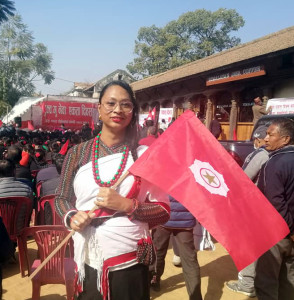 I started getting more and more active in my Newa community and together with a group of like-minded people started ‘Save Nepa Valley’. I left the group due to my personal circumstances in 2019 April.
I started getting more and more active in my Newa community and together with a group of like-minded people started ‘Save Nepa Valley’. I left the group due to my personal circumstances in 2019 April.
I do my short comedy videos called Ruku Yu Vines. It isn’t just claiming a space in the field that usually portrays trans people as ‘humorous’ and ‘a matter of joke’ but also re-claiming a space for Newa contextual content.
After my Grade 10, I acquired my citizenship. It wasn’t a big deal for me. However, I didn’t like the fact I was compelled to list myself as “Others”. Not only did I find that derogatory, but also something that did not address me correctly. The only thing I could do was put the name I wanted to be addressed as. Some people also have this misconception that transgender people are ‘third genders’. No we are not. Transmen identify as men, Transwomen identify as women. Some people do identify out of this binary: ‘non-binary’. Third gender is more traditional concept. Some people do identify with this, while particularly in the younger generation, people don’t use this term anymore. Who is first and who is second? I don’t want me being labeled with derogatory terms, and be recognized as “Female”, not “Others”.
However, Nepal has no proper legislation for trans people. It depends on the authority who is responsible. I got my citizenship with my chosen name, but I am not able to change my past documents to the identity I want. I don’t want to be labeled as “Others” just because I am a trans person. I am fighting with the government to be enlisted as “Female”.
I am a lot more confident now and I can defend myself. But I was frustrated because of the educational system in Nepal which doesn’t allow me to change my name and so colleges and universities won’t admit me. They don’t give me anything written either so I can’t challenge them in the court of law. I am trying to get into law college somehow. Last year, I got selected for a 6 months fellowship in UK. There I did a session in law and realized that there are no transgender lawyers. If I have the skills then I can file and fight cases for trans people. I have yet to be admitted in a university yet. But I know that I can and I will. I want to do this not just for me but for everyone else who face barriers as a transgender person.
I am definitely in an emotional turmoil. All the legal provisions in Nepal have definite barriers for me, be it education, health, employment, or even international travelling. While it is a struggle to bring changes that matter, I have so less time to focus on myself.
However, I try to calm myself, I have waited for these many years, it is just few more.
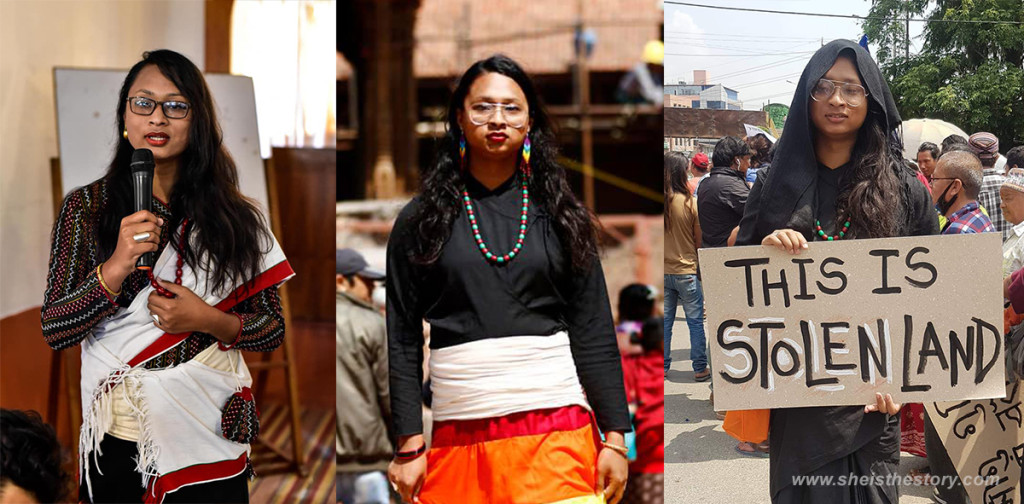
- All photos from Rukshana’s Facebook



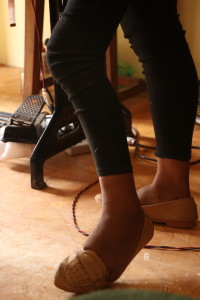 When I was 4 years old, I got measles and then my left leg was infected by the polio virus. I could not walk anymore. I needed someone to carry me. My mother worked very hard for me. She used to carry me to the hospital for my treatment. Due to polio, I could not go to school. I joined school, when I was 9 years old. My friends used to carry me from my house to school.
When I was 4 years old, I got measles and then my left leg was infected by the polio virus. I could not walk anymore. I needed someone to carry me. My mother worked very hard for me. She used to carry me to the hospital for my treatment. Due to polio, I could not go to school. I joined school, when I was 9 years old. My friends used to carry me from my house to school.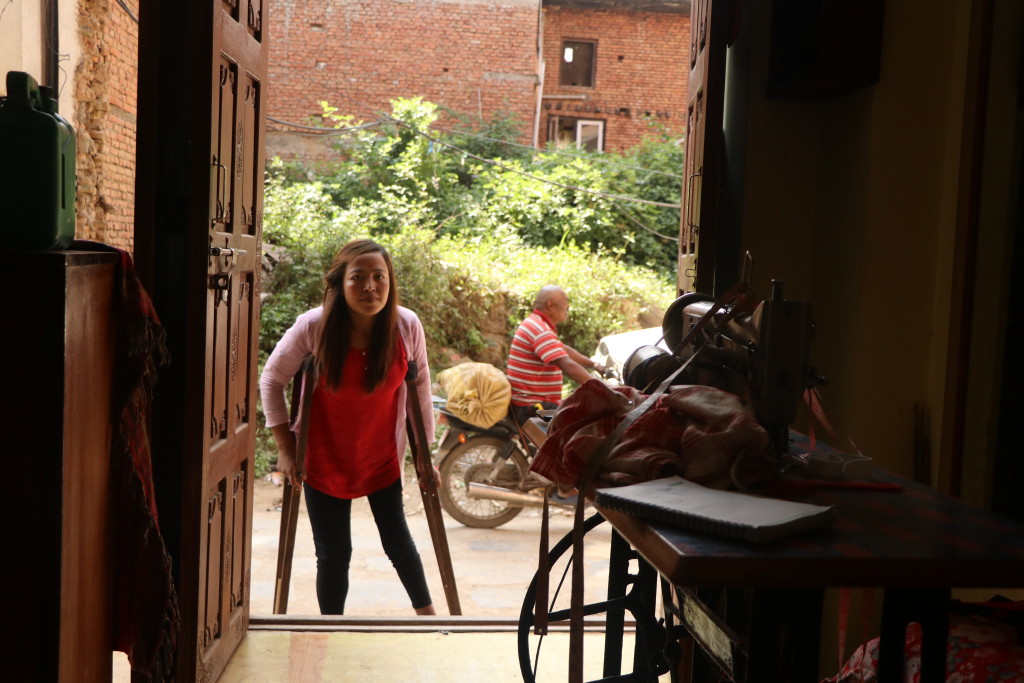
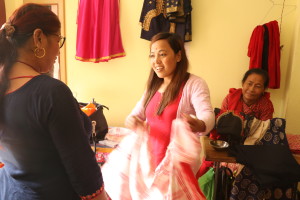 While I was home in between jobs my friends would come to my house and give me their clothes to mend. Slowly they started asking me to sew clothes for them. In the beginning, I refused them several times. But they wouldn’t take no for an answer and eventually I ended up sewing clothes for them. They were very impressed by my work and this really inspired me. So I started sewing clothes for whoever asked from my house. I used to own a gold earring that my mother had given me when I was a child. I sold those gold earrings for 9000 rupees (90 $) and bought myself a sewing machine with that money. Actually I bought two second hand machines and then started working as a seamstress from my own house. My entire community supported me and I was able to contribute financially at home. This made me feel very proud of myself. Everything people said until then about how I would be a burden to my family was turning out to be wrong.
While I was home in between jobs my friends would come to my house and give me their clothes to mend. Slowly they started asking me to sew clothes for them. In the beginning, I refused them several times. But they wouldn’t take no for an answer and eventually I ended up sewing clothes for them. They were very impressed by my work and this really inspired me. So I started sewing clothes for whoever asked from my house. I used to own a gold earring that my mother had given me when I was a child. I sold those gold earrings for 9000 rupees (90 $) and bought myself a sewing machine with that money. Actually I bought two second hand machines and then started working as a seamstress from my own house. My entire community supported me and I was able to contribute financially at home. This made me feel very proud of myself. Everything people said until then about how I would be a burden to my family was turning out to be wrong.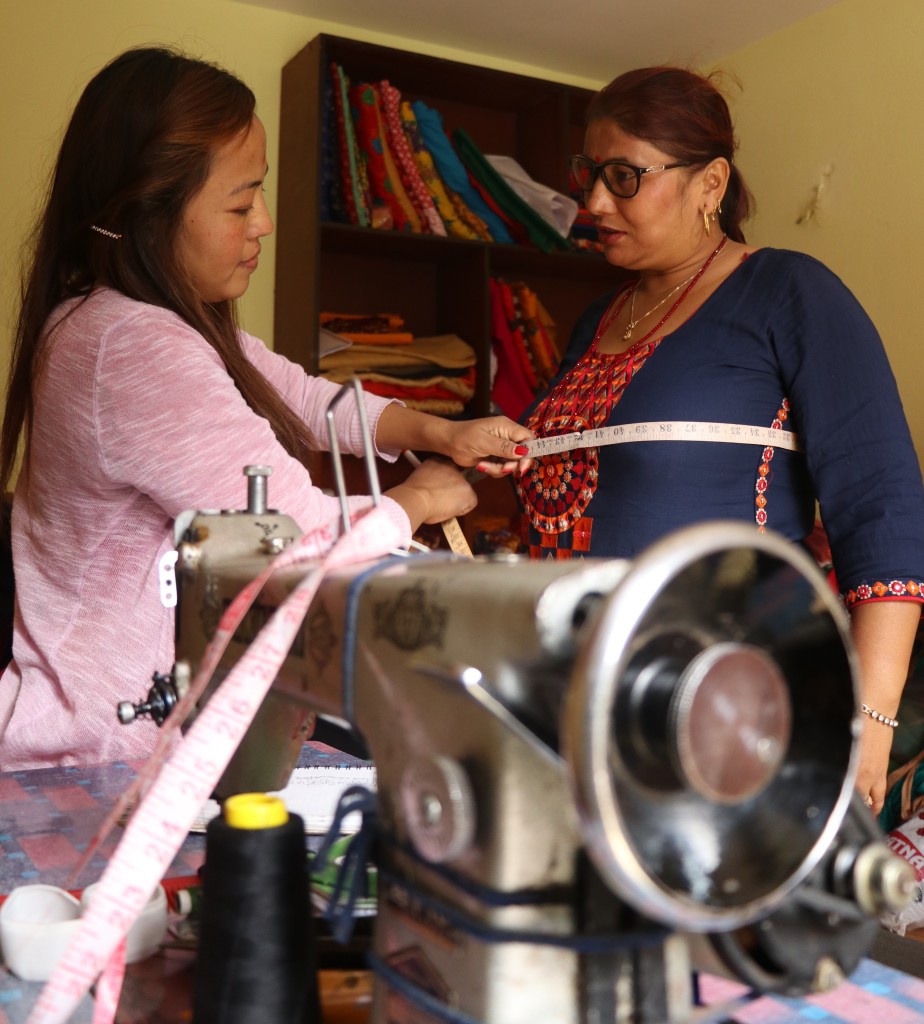
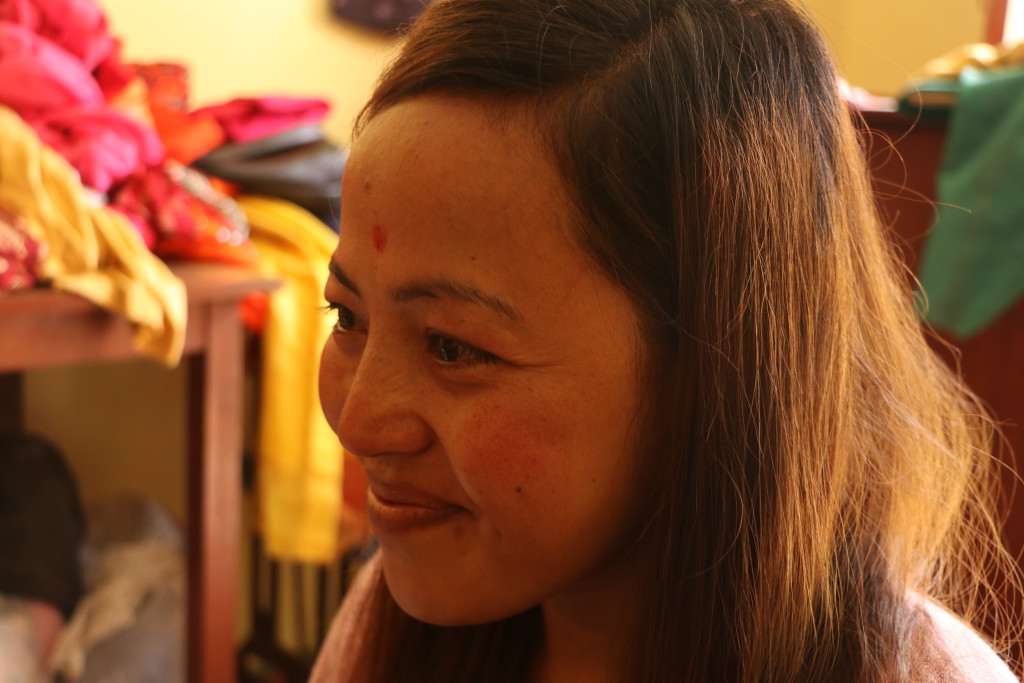

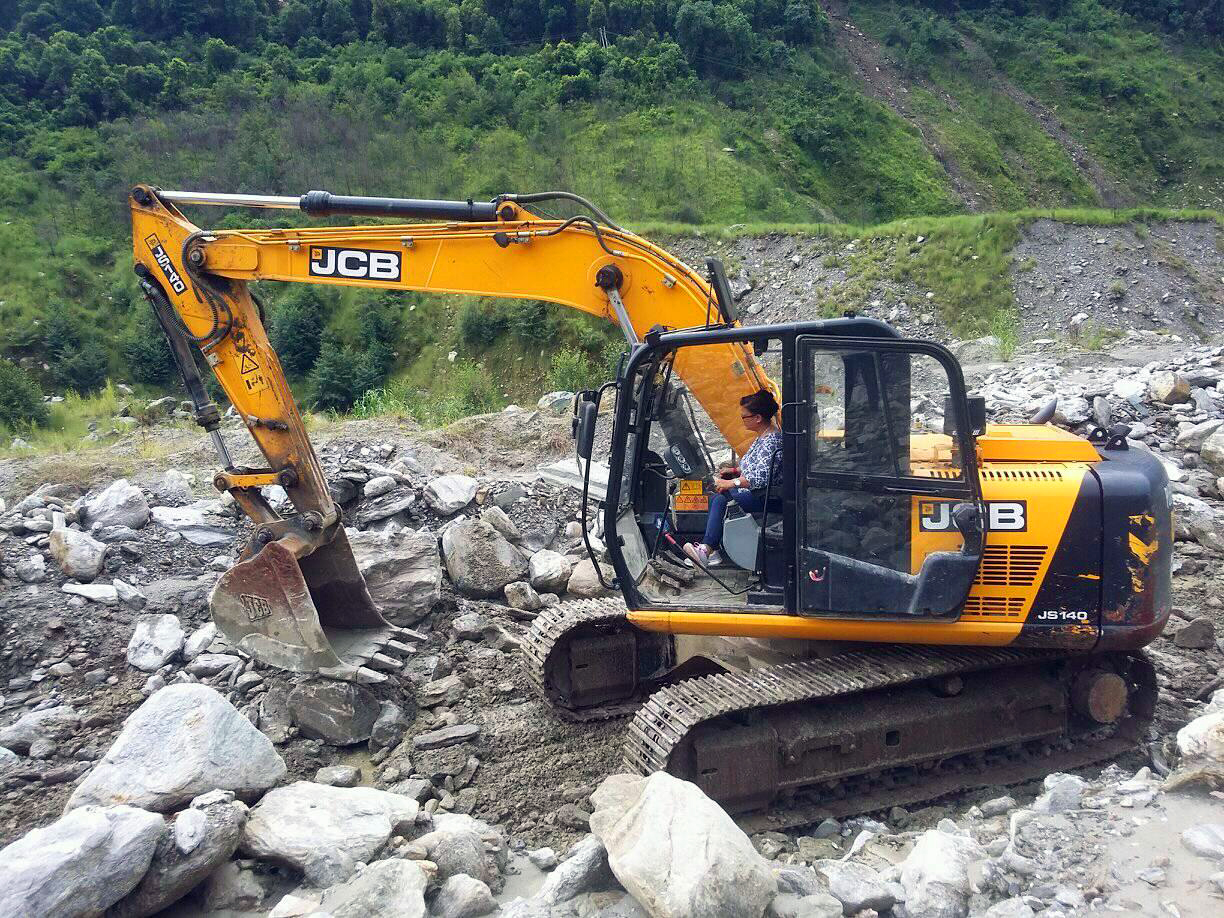
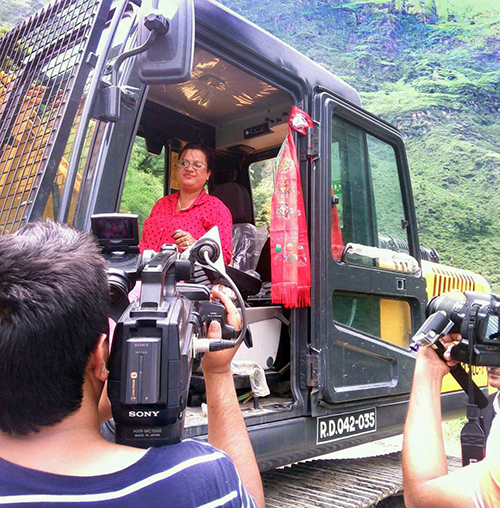
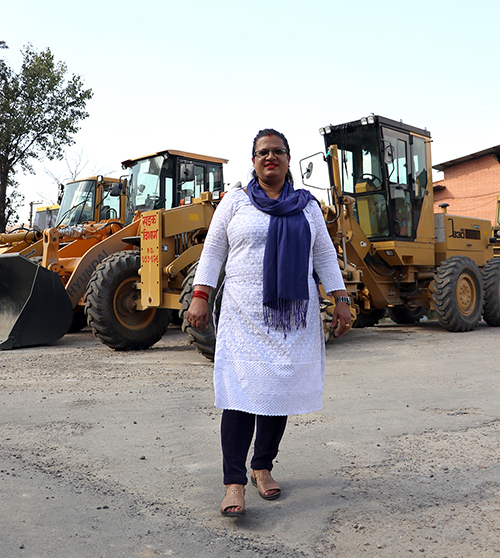
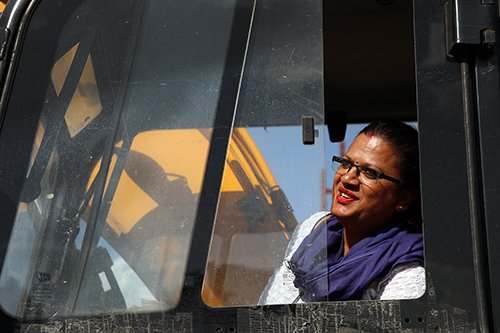 Growing up, my mother had to walk long distances to fetch drinking water while my neighbors had access to tap water. I used to feel really bad about it. After working, with my first pay I installed a tap at my house. One time, my father was really sick and the doctors in our town had given up hope. But I worked hard, saved my money and brought him to a hospital in Kathmandu where the treatment was better and he survived. In doing that, I shut the mouth of my neighbors who would say that only a son takes care of their parents in the old age.
Growing up, my mother had to walk long distances to fetch drinking water while my neighbors had access to tap water. I used to feel really bad about it. After working, with my first pay I installed a tap at my house. One time, my father was really sick and the doctors in our town had given up hope. But I worked hard, saved my money and brought him to a hospital in Kathmandu where the treatment was better and he survived. In doing that, I shut the mouth of my neighbors who would say that only a son takes care of their parents in the old age.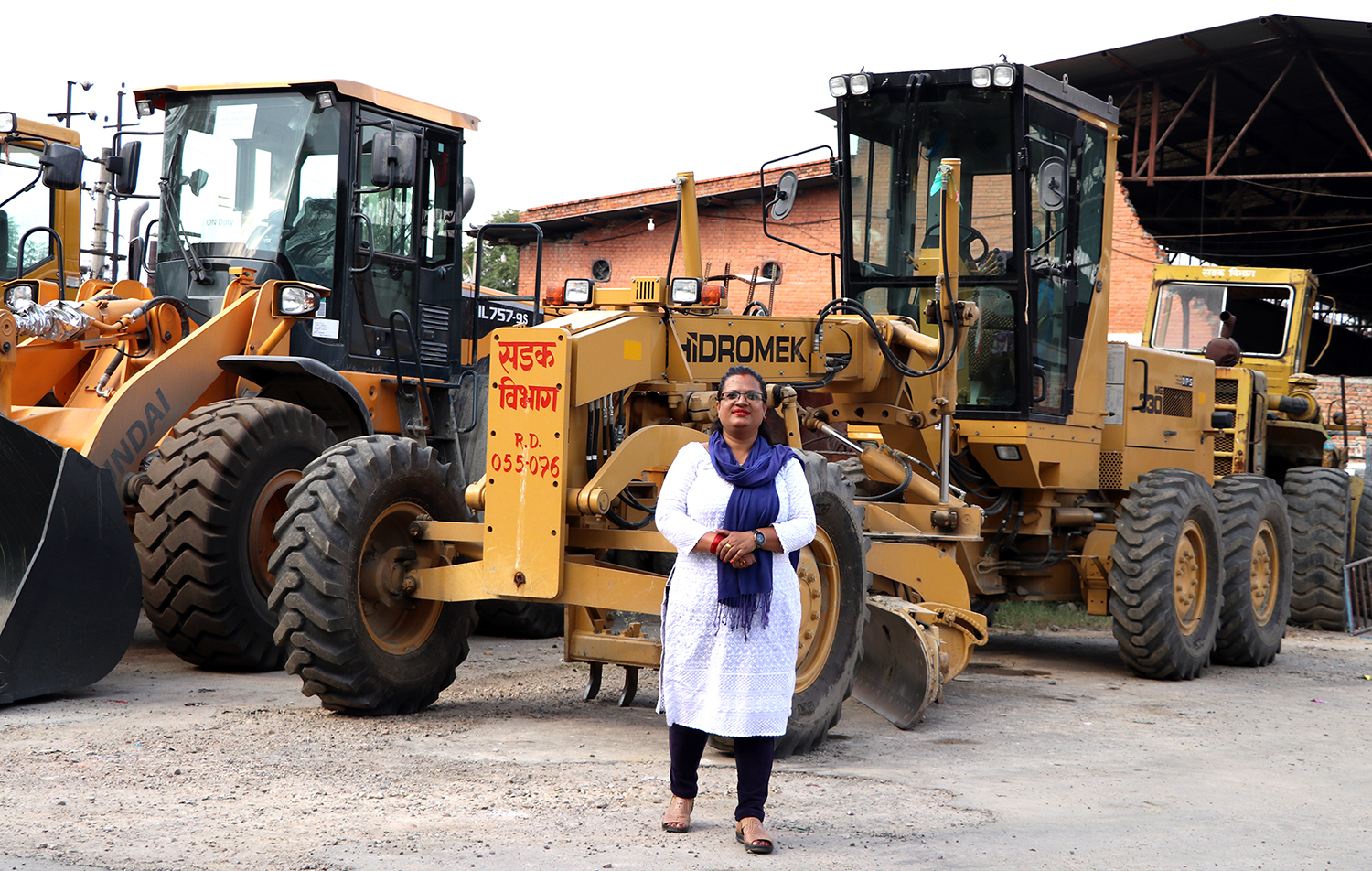
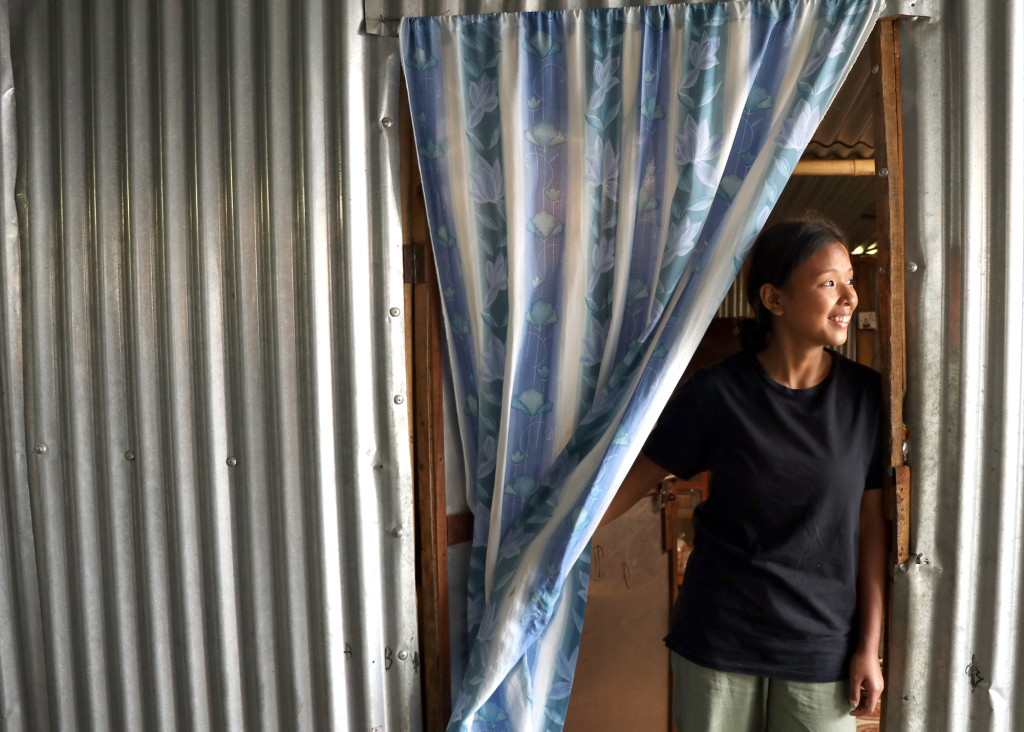
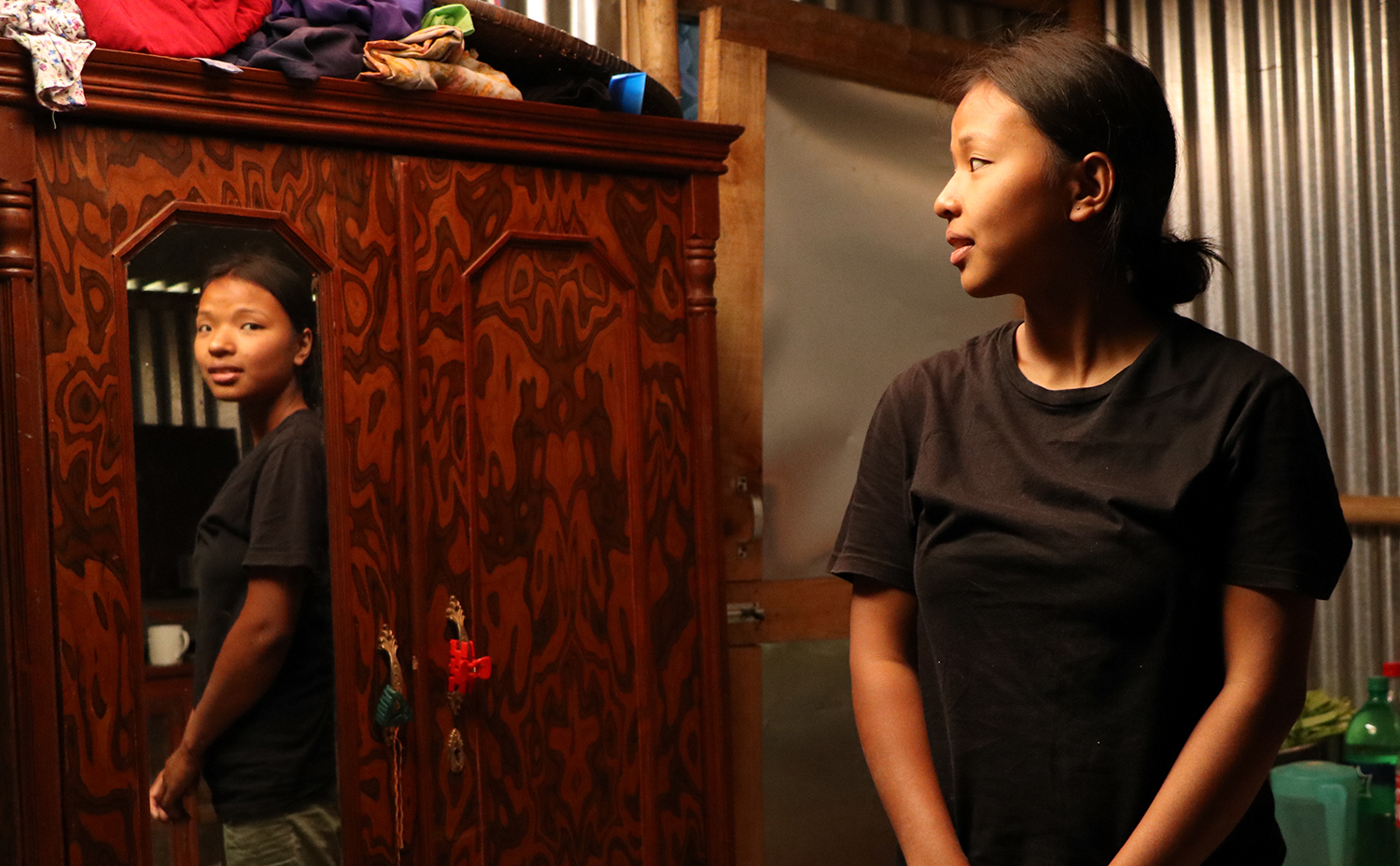
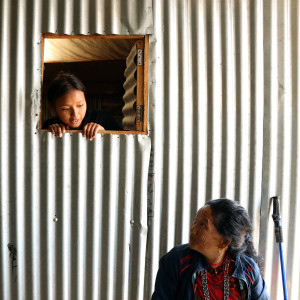 er told us that we should go stay outside of jail so we could study and have a sort of a normal life.We then met Pushpa mamu who took us and we stayed in a hostel not far away. We would come every weekend to visit our mother. I felt really good whenever I would spend time with my mother. She would cook for us and we would sleep together. I loved the way she cooked food and played with my hair. My mother would also sew clothes, knit sweaters inside jail and earn money that way. She also made new clothes for us during the festivals.
er told us that we should go stay outside of jail so we could study and have a sort of a normal life.We then met Pushpa mamu who took us and we stayed in a hostel not far away. We would come every weekend to visit our mother. I felt really good whenever I would spend time with my mother. She would cook for us and we would sleep together. I loved the way she cooked food and played with my hair. My mother would also sew clothes, knit sweaters inside jail and earn money that way. She also made new clothes for us during the festivals.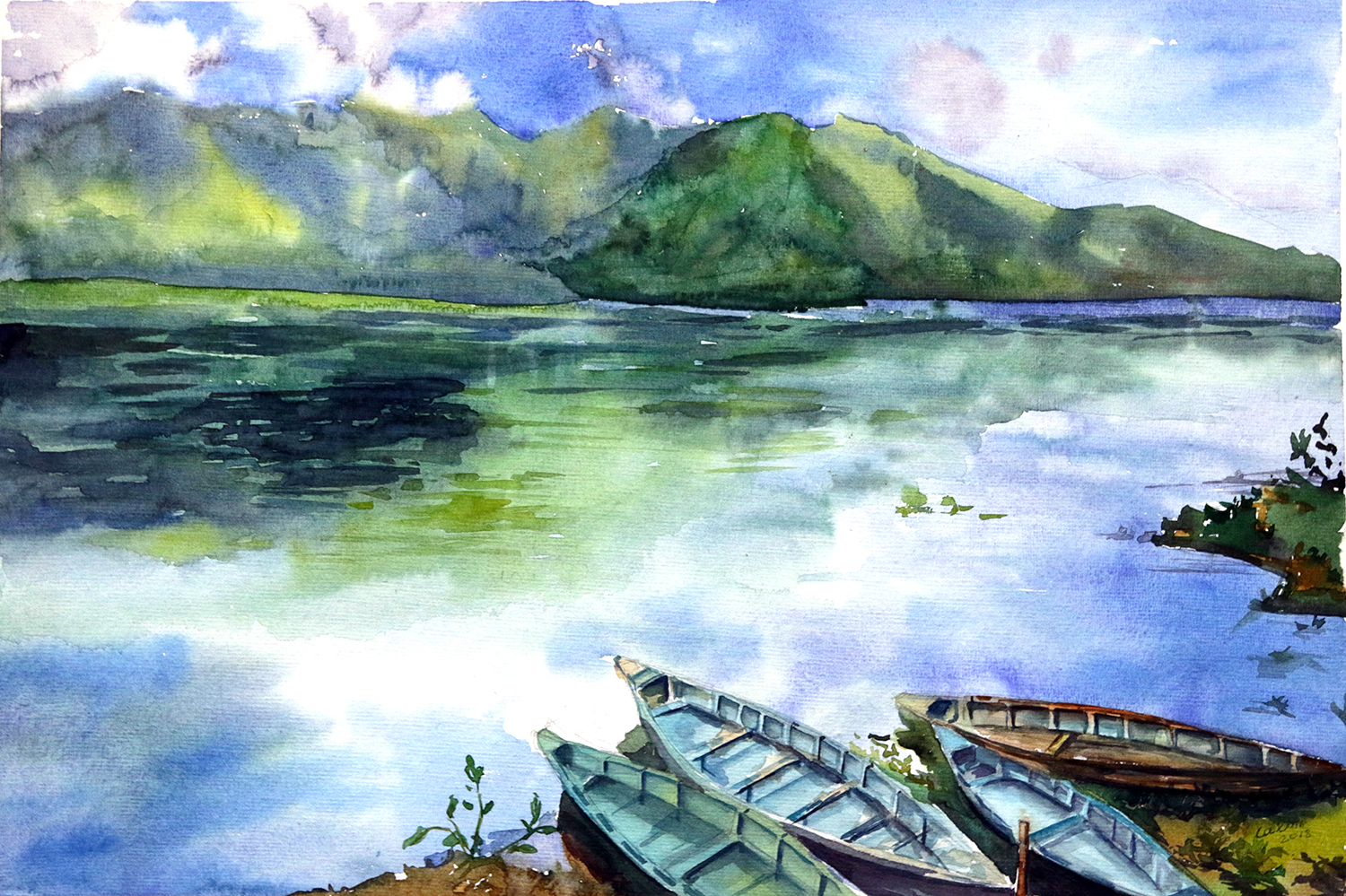
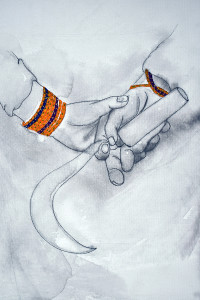
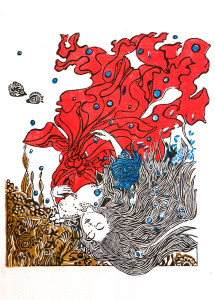 My mother reminds me that everything happens for a reason. Even when bad things happen, there is something good that comes out of it. I feel very fortunate to be a part of the family that I now call my own. If I hadn’t gotten a chance to stay here, who knows, maybe I would be one of the thousands of young girls working in the Gulf. When we go back to my village, people are proud of me and appreciate that I am so focused on my studies. Even though my mother suffered a lot, she ended up creating a life for us that is a very good life.
My mother reminds me that everything happens for a reason. Even when bad things happen, there is something good that comes out of it. I feel very fortunate to be a part of the family that I now call my own. If I hadn’t gotten a chance to stay here, who knows, maybe I would be one of the thousands of young girls working in the Gulf. When we go back to my village, people are proud of me and appreciate that I am so focused on my studies. Even though my mother suffered a lot, she ended up creating a life for us that is a very good life.

 which her two oldest daughters were successfully sponsored to attend boarding school and receive a quality education, as well as the necessities of physical care and nourishment.
which her two oldest daughters were successfully sponsored to attend boarding school and receive a quality education, as well as the necessities of physical care and nourishment.